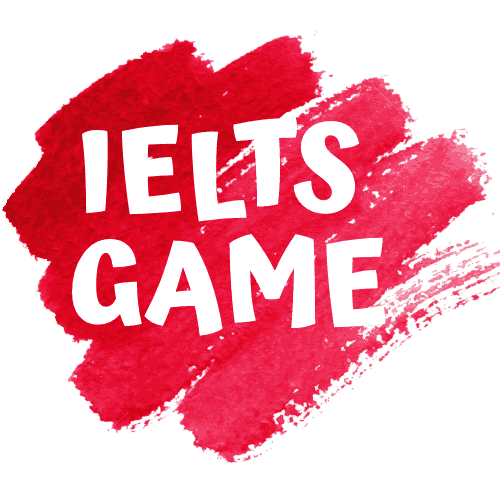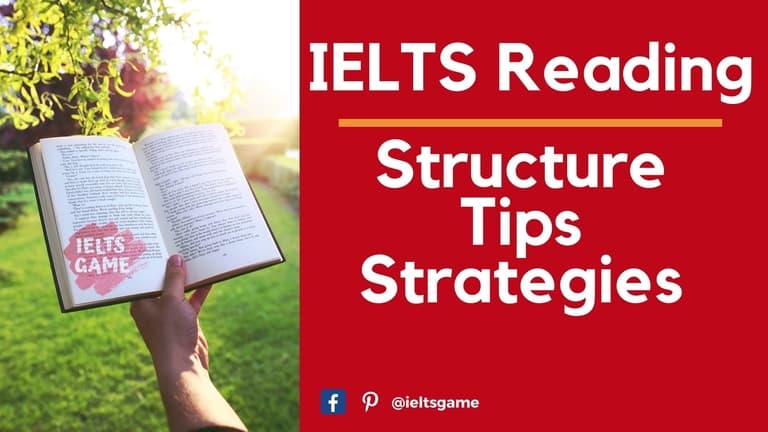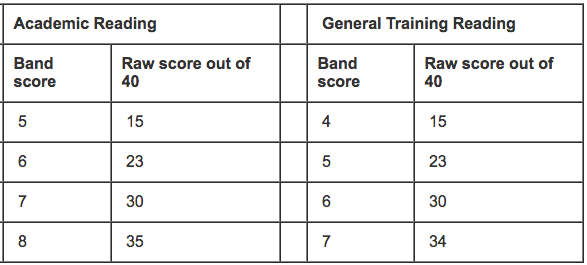IELTS Reading: Structure, Tips, Strategies
Reading is one of the four sections in the IELTS test.
Some candidates consider this part to be the easiest one as one doesn’t have to do anything special – just read and answer questions.
What’s so difficult? Meanwhile, for others Reading is the most challenging section.
They believe that one should know a lot of special vocabulary to understand every single word in the text, and they spend too much time on reading long scientific texts and learning all types of vocabulary.
I think both sides have their points. Anyway, all test takers will have to deal with this part, so you have to be prepared.
You shouldn’t underestimate the tasks in this section and have proper practice and preparation before the exam.
At the same time, don’t be scared to death of the Reading section. Like any other part of the test, it can be quite easy to deal with.
In this article, IELTS Game will look at this section of IELTS in details and discuss the difference between Academic and General Training Reading, strategies of reading and tips for preparation.
Table Of Contents
General Information about IELTS Reading exam
First of all, let’s discuss some basic things about this section. Reading consists of 40 questions that are grouped into 3 sections. You have 60 minutes to complete this part.
Pay attention that, unlike the Listening section, Reading doesn’t have extra 10 minutes to transfer the answers to the answer sheet. You must do everything within 60 minutes!
There are different tasks in the Reading sections of Academic and General Training Modules of the test.
So make sure you know what module you need to pass. You probably don’t want to prepare for different tasks.
The difference between two formats is mostly in the content of texts for reading, but in both modules, there is the same number of questions (40), and types of questions are very similar.
That’s why you can apply the same strategy for completing Academic Reading and General Training Reading tasks.
General Training Reading
Reading in this Module is much easier than in the Academic one.
The passages for reading are shorter, and they have more simple vocabulary. The topics of texts usually refer to daily life.
General Training Reading also includes 40 questions, but the number of passages for reading can be different.
- In the first Section, there will be 2 or 3 short texts related to everyday topics (notices, advertisements, publicity booklets, timetables, etc.).
- In Section 2, you will have two short passages related to work in some way.
- And in Section 3, there will be one longer text on a more abstract or academic topic. The last section is considered to be the most difficult one.
You can find a sample paper to practice General Training Module on the British Council website.
IELTS Academic Reading
In the Academic IELTS Reading, you are going to have three large texts. There are about 10-14 questions for each text, and you have 60 minutes to answer them.
The topics for the passages are usually of general interest but related to an academic subject. They often deal with global issues, such as the environment, science, history, tourism, etc.
Don’t be scared; it’s not necessary to be an expert in any of these fields to complete the tasks successfully.
Although you are likely to read a lot of special vocabulary (e.g. some technical terms), you don’t have to understand the meaning of every word to get the main idea of the text.
However, if you know a wide range of different vocabulary, that would be a great advantage.
You can find a sample Academic Reading paper on the British Council website. Try to complete the tasks and then check your answers.
Reading Score System in IELTS test
In the Reading section, each question is worth 1 point. It doesn’t matter what section a question refers to, you will get only 1 point if it is correct. And if your answer is wrong, you get no points (not -1, as someone may think).
So, you can achieve a “raw” score of up to 40 points. Then this “raw” score is converted into the Band score.
But how is the conversion made? On the official IELTS website, there is a short explanation of the band conversion:
Pay attention that scores are calculated differently in two modules of the test.
For example, you need to have 30 correct answers to get Band 7 for Reading in Academic IELTS, but in General Training IELTS you need 34 points.
Different Strategies to answer IELTS Reading exam
The biggest challenge in this part of the test is probably time management.
You have only 60 minutes to read three long texts and answer 40 questions.
Most likely you will not have enough time to read each passage carefully. That is why you must learn to apply some reading techniques.
1. Skimming
This type is also called “speed-reading”.
When you skim read the text, you don’t want to understand the text completely, you read to get the main idea.
It’s not necessary to read every word and sentence.
You may read the title, the first sentence of the paragraph and the last sentence of the paragraph.
Usually, it’s enough to understand the main idea.
2. Scanning
The next reading method is scanning. Again, here you don’t have to read every word and phrase.
You scan the text in order to find the information you need, e.g. some numbers, names, and dates.
But before scanning the text, you must read the question properly to be well aware of the information you will need to find.
3. Detailed reading
This technique means that you read the text carefully in order to understand every detail.
But you may not need this method for all questions types in the Reading section.
This method is very useful for such questions as True/False/Not given or Yes/No/Not given.
Some IELTS experts say that there is no use in applying different techniques during Reading.
They believe that it’s enough to be well aware of question types and be able to answer each type.
Also, there is a lot of concern as to whether one should first read questions and then passages or, the other way round, first passages and then questions.
What I would really like to point out is that you must practice with reading a lot and then choose for yourself what’s the best way to deal with this section.
You can apply any of the reading techniques if they work for you.
But if you get distracted with skimming or scanning, don’t use them. It’s better to use detailed reading in this case.
You need to learn to read quickly so that you will have time for both reading and answering questions.
And, of course, you must know what questions to expect in the exam.
Types of questions
In the Reading section you’re likely to have the following question types:
- Multiple Choice
- True/False/Not Given
- Yes/No/Not Given
- Matching Headings
- Matching Information
- Matching Features
- Matching Sentence Endings
- Sentence Completion
- Labeling a Diagram
- Notes/Table/Flow Chart Completion
- Short-Answer Questions
- Summary Completion
For more detailed information about how to deal with each task, read the article “IELTS Reading: Types of Questions”.
IELTS Reading Tips
There are some useful tips that will help you prepare properly for the Reading section.
1. Read as much as you can before the test.
This is the most simple and at the same time the most useful advice that any IELTS tutor can give you.
It’s highly important to read a lot when you prepare for the test. It will help you improve your reading speed.
Moreover, reading would be very helpful in expanding your vocabulary.
You can read anything. But make sure that you read in English.
I would recommend to choose something that you’re interested in. This way it will be easier for you to read every day.
Here is the list of some Internet websites that you can use for reading:
- National Geographic is a magazine about the surrounding world. Here you will find interesting articles about nature, travel, adventure, and scientific news.
- New Scientist – the title speaks for itself: here you will find the latest news and discussions from any fields of science.
- The Economist – it is a news magazine, publishing events from the sphere of economy, politics, international relations, finance, etc.
- History Today – this British edition allows you to plunge into the history and look at some events from the other side.
- Time – this American publication covers all the latest events in the USA and the world.
- Cosmopolitan – a magazine for girls about fashion and beauty industry.
- Wired – a magazine about computer technologies and their impact on the modern world.
2. Practice each question type.
Besides practicing reading, you must do as many practice tests as possible to get acquainted with different task types.
3. Read the instructions carefully.
When you complete the Reading tasks, always read the instructions even if it’s the 100th test you take.
The instruction can tell you how many words you need to write, and you must stick to this number strictly.
For example, you have the task to complete the sentences, and you must write three words or less.
In this case, the answer ‘the population of this region’ would be wrong, you have to write ‘this region’s population’ instead.
4. Time management.
Every time you do a practice reading test, follow the time. It will get you acquainted with the time management.
You should also remember that there is no use to spend too much time on one question.
If you realize that you can’t answer the question now, just skip it and come back to it later when you have answered all other questions.
Keep in mind that every question is worth 1 point, so it’s advisable to spend the same amount of time on every question.
Don’t forget that you have no extra time to transfer the answers to the answer sheet.
5. Find your way to complete the tasks.
During your preparation for the test, you should try all reading techniques and then choose the one (or two) that is the easiest for you.
If you always succeed with skimming, use it at the exam. But if you couldn’t apply this method during the preparation, there is no use trying it on the exam day.
The same strategy should be applied to reading questions. If it’s easier for you to start reading questions first, and then the passages, do it.
But if you find it more convenient to read the whole passage first, feel free to start with reading.
Tricks in IELTS Reading
I think every section of the IELTS test has its peculiarities and tricks. Let’s see what pitfalls the Reading part has:
1. Paraphrases and synonyms.
Reading section has a lot of them. Of course, having the same expressions in the passage and in the question would be too easy.
When you read a question, be ready to look for synonyms or paraphrases in the passage.
2. Grammar.
There can be grammar tricks too, that is why you must always read tasks and passages carefully.
In the question, you may be asked to write a plural form, but in the text you have a singular.
Or in your answer, you may need to use another tense form. Pay attention to these details.
3. Spelling.
Mind the spelling of words as it is very important. If you misspell a word in the answer, it will be considered wrong so you will lose points.
For more information about spelling, read the article “Spelling for IELTS”.
4. Confusing words.
You must pay attention to words that can confuse you (e.g. in True/False/Not Given questions).
For example, the frequency words “always/often/sometimes”.
Keep in mind that they are all different. If you have a word “sometimes” in the passage and always in the question, the answer will probably be “FALSE”.
5. Order of questions.
The simple thing about the Reading is that the order of questions always coincides with the order of the information given in the text.
So, questions don’t “jump”, they always follow each other.
Good luck!
Important Links
Reading preparation
- IELTS Reading Sample 1 “Population Viability Analysis”
- IELTS Academic Reading Sample 2 “Paper Recycling”
- IELTS Reading Sample 3 “Looking for a Market among Adolescents”
- IELTS Reading Sample 4 “Destinations For International English Students”
- IELTS Academic Reading Sample 5 “The Discovery Of Uranus” – Answers
- IELTS Academic Reading Sample 6 “Tracking Hurricanes” – Answers



10 Comments on “IELTS Reading: Structure, Tips, Strategies (Academic & General)”
I’d like to take the IELTS next year.
plz provide general ielts sample papers
I would like to prepare myself before get into the IELTS examination.
Hi,kindly assist me with prepations for ielts academic will be sitting for the exams in june.thank you
Please Sir/ Madam, I want to appear in lELTS Exam in next month so please provide the sample papers for academics.
Thanks
hi, from where i get material to prepare for IELTS
I am truly thankful to the owner of this web site who has shared this fantastic piece of writing at at this place.
I like the efforts you have put in this, regards for all the great content.
Great information shared.. really enjoyed reading this post thank you author for sharing this post .. appreciated
Nice post. I learn something totally new and challenging on websites